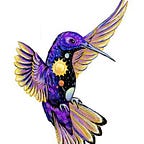Positive Futures: A column about hopes for the future — #4
Citizen Science by Jean-Paul L Garnier
April 2023 | Utopia Science Fiction Magazine
The days of the lone scientific maverick, romantic as they may have been, are over. We live in the era of big data science. In fact, overwhelming amounts of data. In many cases the organizations collecting this data do not have the resources to actually sift through all of it, especially when humans are better suited for certain tasks and pattern recognition. In other cases, computers are well suited for processing, but the organizations has finite access to processing power. In both of these situations you can get involved and work with the scientific community, even with only a layman’s knowledge.
From biology to planetary science and astronomy, there is a science project out there that you can actively or passively participate in and to aid in human understanding. Whether you are into ornithology or dark skies preservation you can contribute to science, and often learn in the process. Your level of involvement is up to you, and there are many ways to join in. Links to some of these projects have been included, but there are many more out there worth exploring.
Passive Participation
Want to contribute but don’t have the time? You can donate your computer’s down time to help process data. Passive participation is by far the easiest way to get involved in citizen science and after the initial setup requires little to no effort. BOINC is freeware that connects with many projects, and allows you to pick and choose which programs you would like to donate processing time to, such as SETI@home. https://boinc.berkeley.edu/
https://setiathome.berkeley.edu/
Active Participation
If you feel like putting a little bit of effort into your citizen science there are many easy ways to use your computer or smart phone and its camera. These programs can be a fun way to get involved and often work similarly to simple video games. Pass your free time by cataloging moon craters, galaxies, solar flares, and more.
https://www.zooniverse.org/
https://cosmoquest.org/x/science/moon/
Apps
A quick search for citizen science on any app store will yield a variety of projects that you can contribute to using just your smart phone and its camera. From measuring light pollution to bird watching, there is a project for just about any line of intrigue, so take some time away from doom-scrolling and see how you can make an impact in science with these simple and free tools.
Gearing Up
If you feel like taking things a step further and getting hands on, there are plenty of ways to do that too. Depending on the amount of money or time you would like to spend there are enough projects out there to keep you busy. Some of these more active projects may require a bit of hands-on skill, others don’t, but all of them are fun ways to participate in citizen science while learning in the process. From radio and visual astronomy to growing moon tomatoes there are many projects out there that will allow you to actively contribute data to important scientific projects, such as: https://radiojove.gsfc.nasa.gov/
http://tomatosphere.org/
https://www.unistellar.com/citizen-science/
Originally published in the April 2023 issue of Utopia Science Fiction Magazine.
Jean-Paul L. Garnier lives and writes in Joshua Tree, CA where he is the owner of Space Cowboy Books, a science-fiction bookstore, independent publisher, and producer of Simultaneous Times podcast. In 2020 his first novella Garbage In, Gospel Out was released, and in 2018 Traveling Shoes Press released Echo of Creation, a collection of his science fiction short stories. He has also released several collections of poetry: Future Anthropology, Odes to Scientists (2019), Betelgeuse Dimming (2020), and Utopian Problems (2021). He is a five-time Elgin Nominee and appeared in the 2020 Dwarf Stars anthology. He is a regular contributor to DreamFoundry.org’s blog.
